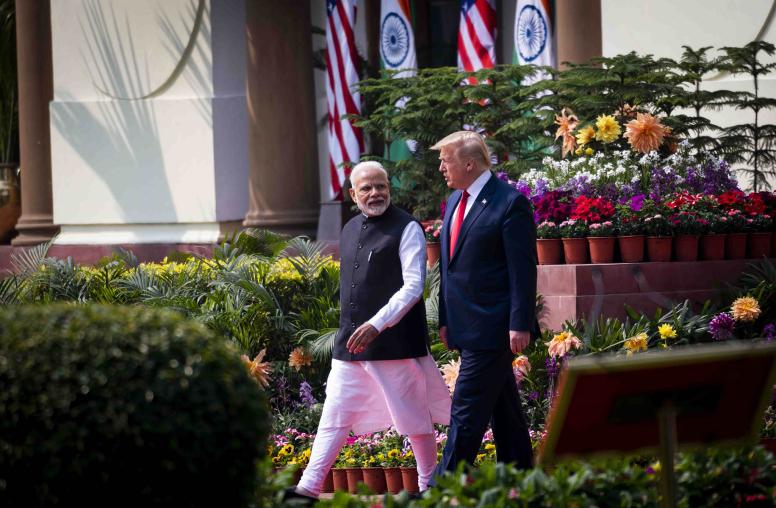Rising Religious Revanchism in Turkey and India Has Dire Consequences
The recent conversion of sacred sites in both countries has added to concerns over the erosion of democratic traditions and growing authoritarianism.
Forced conversions are usually about people. But two sacred sites were recently transformed in Turkey and India, with potentially dire consequences for those countries and the world.

Turkey and India are fascinating places with diverse cultures and legacies of ancient civilizations. While worlds apart, striking parallels have arisen with the treatment of the Hagia Sophia in Istanbul and the Babri Mosque in Ayodhya.
In July, the Hagia Sophia was reopened as a mosque, a status it hasn’t held since 1934 when the founder of the Turkish Republic, Mustafa Kemal Atatürk, turned the cathedral-then-mosque into a museum. A few weeks later in India, a foundation stone was laid to build a Ram Temple on the site of the Babri Mosque, a site contested between Hindus and Muslims since the 1800s.
Both have complicated histories intersecting with religious fault lines over centuries. Emperor Justinian I built the Hagia Sophia as a cathedral in 537, believed to be the largest structure in the world at the time. In 1453, its church status was annulled by Mehmet II after the Turks conquered Constantinople and turned it into a mosque. Several decades later, the Mughal dynasty constructed the Babri Mosque in 1529. Hindu devotees claimed the site as the ancient birthplace of Lord Ram, and a movement arose calling for the mosque’s destruction. Hindu mobs tore down the mosque in 1992, which led to reprisals in 2002 and then large-scale mob attacks against Muslims in Gujarat.
Putting Politics Over Religious Inclusion
It’s beyond obvious that these places are sensitive. Yet in modern times, populist politicians in Turkey and India successfully used majoritarian religious narratives to parlay this radioactivity into votes. As political totems, the Hagia Sophia and Babri Mosque/Ram Temple became evergreen issues for President Erdoğan of Turkey and Prime Minister Modi of India. Erdoğan desired for years to return the Hagia Sophia as a mosque. In India, while I served at the State Department, politicians bragged how Modi’s party, the BJP, maintained building the Ram Temple as party plank.
And it’s worked: Erdoğan and Modi have won at the ballot box by repeatedly pounding these revanchist themes, despite worsening economies and coarsening discourse.
Ironically, Erdoğan and Modi had to rely on court rulings to fulfill their political promises. The judgments were controversial in different ways, but legal legitimacy was critical to getting the job done. Erdoğan and Modi took victory laps, personally visiting the site for the first events after the conversion. Erdoğan analogized the victory to the Al Asqa mosque in Jerusalem, promising next to liberate it from Israel. Modi’s speech put the event in war-like terms, referencing the “struggle” and “sacrifices” made to bring this day about.
But these efforts came at a cost. In both Turkey and India, religious minorities are alarmed. Turkey’s historic Christian community feels increasingly vulnerable. The language employed by some about the conquest of Christianity was deeply disturbing. Likewise, India’s Muslim population feels besieged. Modi held the Ram Temple event on the one-year anniversary of the downgrading of the status of Kashmir, while Indian Muslims must also fear mob attacks, lack of police protection, and even the loss of citizenship. And for both countries, observers increasingly express concern about an erosion of democratic traditions and the rise of authoritarianism.
The transformations of these sacred places reverberated internationally. Orthodox churches protested around the world. Pope Francis and other Christian denominations expressed dismay and regret, while the U.N., European and North American governments spoke out. A similar—but less widespread— response was found for India, with Pakistan denouncing the ceremony and the Organization of Islamic Cooperation critiquing the court ruling.
Turkey did commit to keep the Hagia Sophia open to all and to not remove the iconographs of Jesus Christ. Similarly, the Indian Supreme Court decision allowing construction did require the provision of land at a different location to build a new Babri Mosque. But these messages were drowned out by the celebration of the site conversions.
What’s tragic is it didn’t have to be this way. Erdoğan and Modi are savvy politicians, and other avenues existed to take the road less traveled without resorting to toxic symbolism. With their stature, they could have led national dialogues about these complicated histories and emphasized how to peacefully meet the spiritual needs of all communities. They could have painted a hopeful vision of the future— multicultural, respectful, and pluralistic—rather than religiously sectarian.
But such opportunities to build a shared narrative of inclusion were avoided, opting instead to promote narrow religious nationalism. Despite clinging to the flag of their great faiths, Erdoğan and Modi didn't take the high road called for by their religions.
Overall, an important pathway toward peaceful communal relations was lost. Extreme voices welcomed the conversions, seeing religious battle lines drawn both within their countries and internationally. Far from settling these matters, these decisions increased distance between faith communities, creating greater alienation at a time when greater understanding is needed. The controversies won’t end, but division, fear, and anger will fester.



